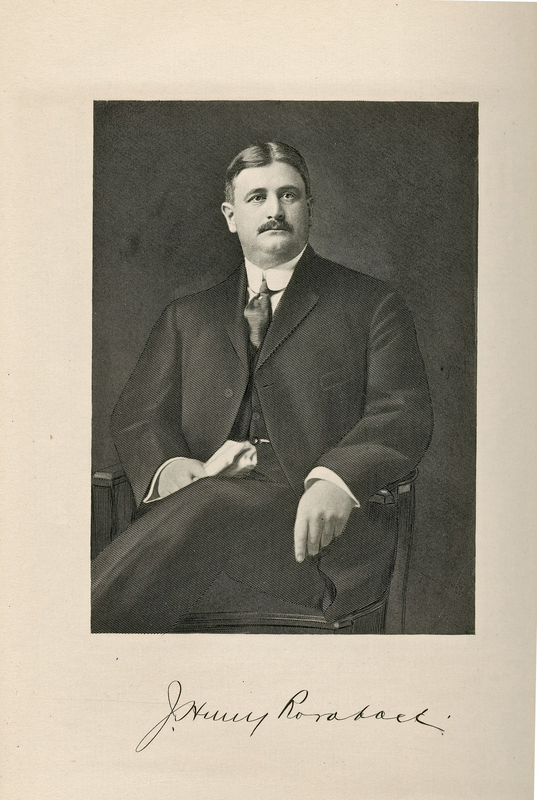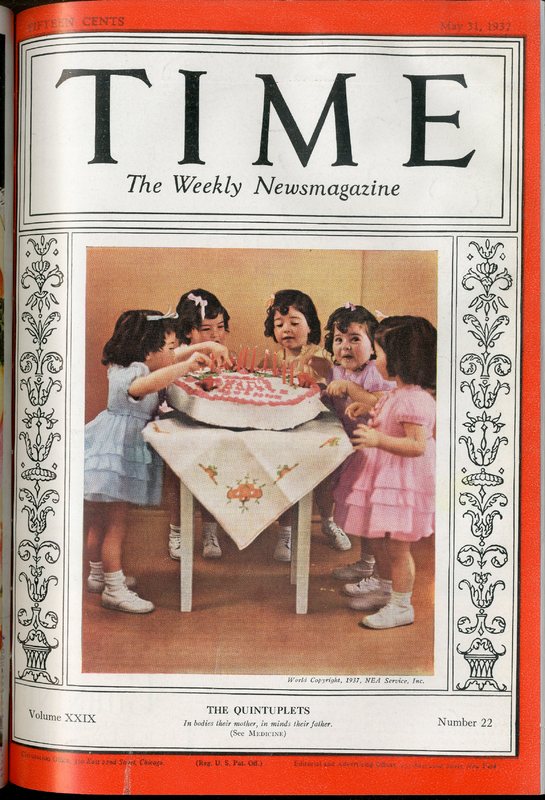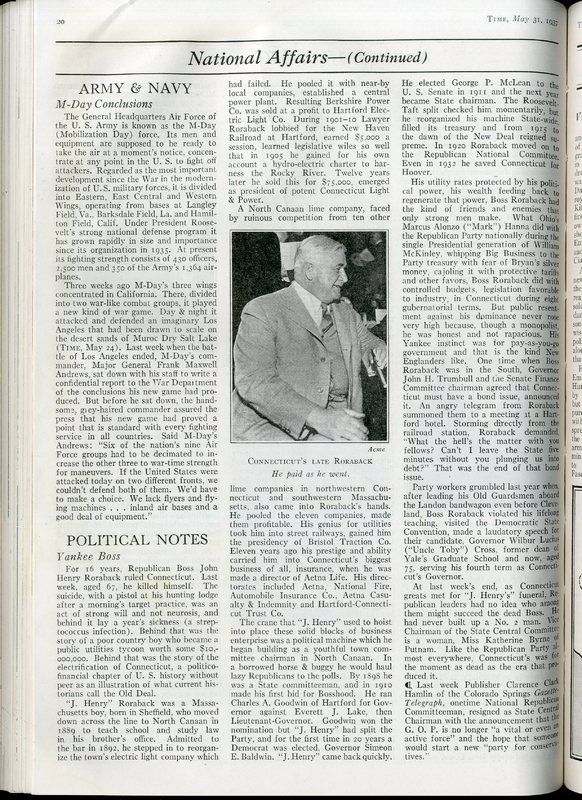J. Henry Roraback
The spark behind CL&P
While he is not responsible for the invention of consumer electrical power, Connecticut Light and Power was the invention of J. Henry Roraback and the expeditious execution of his plans for hydroelectric power in Western Connecticut is a testimony to his substantial political power from World War I until the Great Depression.
Time magazine's article upon his death in 1937 provides a concise bio of Roraback and his rise to prominence:
J. Henry Roraback was a Massachusetts boy, born in Sheffield, who moved down across the line to North Canaan in 1889 to teach school and study law in his brother's office. Admitted to the bar in 1892, he stepped in to reorganize the town's electric light company which had failed. He pooled it with nearby local companies, established a central power plant. The Resulting Berkshire Power Co. was sold at a profit to Hartford Electric Light Co. During 1901-10 Lawyer Roraback lobbied for the New Haven Railroad at Hartford, earned $5,000 a session, learned legislative wiles so well that in 1905 he gained for his own account a hydroelectric charter to harness the Rocky River. Twelve years later he sold this for $75,000, emerged as president of potent Connecticut Light & Power.
A North Canaan lime company, faced by ruinous competition from ten other lime companies in northwestern Connecticut and southwestern Massachucetts, also came into Roraback's hands. He pooled the eleven companies, made them profitable. His genius for utilities took him into street railways, gained him the presidency of Bristol Traction Co. Eleven years ago his prestige and ability carried him into Connecticut's biggest business of all, insurance, when he was made a director of Aetna Life. His directorates included Aetna, National Fire, Automobile Insurance Co., Aetna Casualty & Indemnity and Hartford Connecticut
The crane that "J. Henry" used to hoist into place these solid blocks of business enterprise was a political machine which he began building as a youthful town committee chairman in North Canaan. In a borrowed horse & buggy he would haul lazy Republicans to the polls. By 1898 he was a State committeeman, and in 1910 made his first bid for Bosshood. He ran Charles A. Goodwin of Hartford for Governor against Everett J. Lake, then Lieutenant Governor. Goodwin won the nomination but "J. Henry" had split the Party, and for the first time in 20 years a Democrat was elected. Governor Simeon E. Baldwin. "J. Henry" came back quickly. He elected George P. McLean to the U. S. Senate in 1911 and the next year became State chairman. The Roosevelt/Taft split checked him momentarily, but he reorganized his machine Statewide, filled its treasury and from 1915 to the dawn of the New Deal reigned supreme.
In 1920 Roraback moved on to the Republican National Committee. Even in 1932 he saved Connecticut for Hoover. His utility rates protected by his political power, his wealth feeding back to regenerate that power, Boss Roraback had the kind of friends and enemies that only strong men make. What Ohio's Marcus Alonzo ("Mark") Hanna did with the Republican Party nationally during the single Presidential generation of William McKinley, whipping Big Business to the Party treasury with fear of Bryan's silver money, cajoling it with protective tariffs and other favors, Boss Roraback did with controlled budgets, legislation favorable to industry, in Connecticut during eight gubernatorial terms.
But public resentment against his dominance never rose very high because, though a monopolist, he was honest and not rapacious. His Yankee instinct was for payasyougo government and that is the kind New Englanders like. One time when Boss Roraback was in the South, Governor John H, Trumbull and the Senate Finance Committee chairman agreed that Connecticut must have a bond issue, announced it. An angry telegram from Roraback summoned them to a meeting at a Hartford hotel. Storming directly from the railroad station, Roraback demanded, 'What the hell's the matter with you fellows? Can't I leave the State five minutes without you plunging us into debt?" That was the end of that bond issue.
Party workers grumbled last year when, after leading his Old Guardsmen aboard the Landon bandwagon even before Cleveland, Boss Roraback violated his lifelong teaching, visited the Democratic State Convention, made a laudatory speech, for their candidate, Governor Wilbur Lucius ("Uncle Toby") Cross, former dean of Yale's Graduate School and now, aged 75, serving his fourth term as Connecticut's Governor. At last week's end, as Connecticut greats met for "J. Henry's" funeral, Republican leaders had no idea who among them might succeed the dead Boss. He had never built up a No. 2 man.
From "Yankee Boss." Time. 5/31/1937, Vol. 29 Issue 22, p22. 2p.



